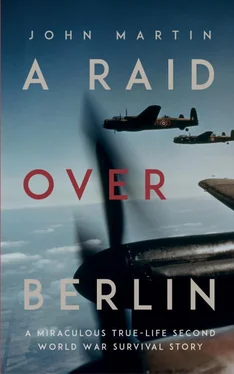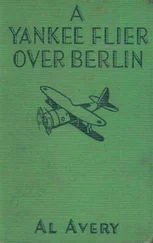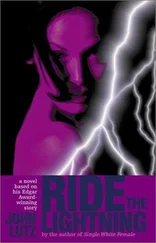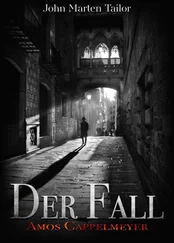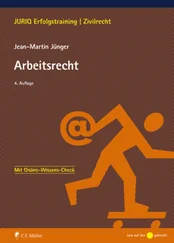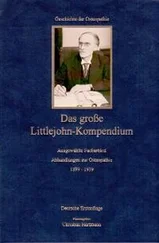*
Our greatest fear now was not the return of the German forces, but that of starving to death. We were half starved before the move and now we were in a far worse position◦– there was nothing.
No Man’s Land was often referred to in accounts of World War One by the veterans of that war, and it occurred to me that that was where we were now. Again, from hearing about that war, bitter fighting must be expected before our forces got to us, and how would we fare in that? Did our forces know exactly where we were? There did not appear to be any aerial reconnaissance in the day time or we would have been out there waving vigorously; it would have been some little thing to do to help ourselves. We had no idea of what to expect or what was expected of us.
At last something did happen; just after it got dark some five days after the part of the columns were returned, a terrific artillery barrage opened up: shells were passing directly overhead, and they sounded to be very low. The noise was unbelievable and to add to the terror, the hut, particularly the roof, was shaking so much it seemed that it would come crashing down on us, even if we did not receive a direct hit. The roof danger was somewhat self-inflicted as during the long cold winter the meagre fuel allocation to burn on the tiny stoves in the huts was stopped entirely; in desperation we allowed self-appointed structural engineers who, after some study of the structure while lying on a top bunk, decided which of the timbers could be removed with reasonable safety and burnt. The barrage continued with no let-up in its intensity until just before dawn. For the whole time, each second appeared to be our last, brought about by a near miss, a direct hit or from being trapped under the wreckage of the hut and left undiscovered.
I had experienced being bombed by the Luftwaffe in the earlier part of the London blitz, being shot down over Berlin, witnessed the terrible effect of carpet bombing by the USAAF in Frankfurt am Main, but I found that having artillery shells passing just overhead, for so many hours, was the most frightening experience by far. I fully understood what people who had suffered flying bomb and rocket attacks in London meant when they said of the two terrorising weapons, they would rather have the rockets, even if they were more devastating, because of the terrible nerve racking seconds between the engine of the flying bomb cutting out, and the explosion upon landing. They had seconds, which would have seemed like an age, to see who was going to get it.
Being young, we soon shook off the fear of the night’s bombardment and getting some food became, once again, the most important thing. We were getting seriously hungry at this stage but where was there to look for food? The Germans had gone, any Red Cross parcel supplies were by now just a memory and there was no sign that we were about to be liberated. Everyone was very noticeably getting weaker. It took a great effort to get up from the bunk, and what was the point? None of the prisoners who had been out on the march would have anything to give away and it would have been very dangerous to venture out of the camp in search of food.
Later in the day the thought struck me that something edible might have been left in the German kitchen, a place prisoner would have had absolutely no access to normally, and this inspired me to get up and investigate. It turned out to be a wasted effort, there was not a scrap of anything inside, so I quickly returned outside, where I noticed a small heap of rotten small potatoes. With nothing at all to be found in the kitchen this miserable heap took on a new value, and getting down on my knees, I stirred up the rotting, slimy mass with my fingers, hoping that some still edible ones could be found. The smell was foul but that was no deterrent, and a few, considering the desperate need, were found that were at least part edible.
Back at the hut I was declared a hero when I returned with my dubious prize. The few rotting potatoes that I was able to find were eagerly washed and the bits that were really inedible chopped off. The wait for the remaining scraps to cook on the blower (a small homemade stove, with the fire boosted by a hand driven fan, based on the same principle as a forge, that had the essential quality of using only a minute quantity of fuel to boil water) was almost unbearable, but to a starving group like we were, it produced by no means a banquet, but a very welcome and much needed bit of nourishment.
*
In the past few days thousands of prisoners of all nationalities who had been on the march from other prison camps, were driven in desperation into Stalag 357. Fortunately, our compound, just a small part of this huge camp, did not become crowded. The few prisoners who were brought into our compound were mainly Russians who preferred to dig holes in the ground instead of going into near vacant huts. From somewhere they acquired rusted sheets of corrugated iron to cover them, making a kind of burrow, and, unbelievably, lit fire down inside them. They appeared perfectly content to live like this; presumably it was an improvement on what they had endured previously.
Soon after the potato feast, I became ill with a high fever and diarrhoea. I felt as though I was surely going to die; in fact, at one point I wished I could have done so. Throughout the night I had to get up to use the latrine. I blamed the potatoes, but early next morning one of our group, who had suffered no ill effects from eating the potatoes, came back to the hut with the bad news that there were many others suffering with similar symptoms in the compound.
He also had some good news◦– the British Medical Officer and some of his orderlies had returned to the camp, but there was a long queue waiting to see him. Ungratefully, I just groaned, but then thought this my only chance of survival. I laboriously donned every piece of clothing I had, wrapped a blanket around myself, and set off. Long before I got to the medical hut I was in a queue of many, all looking very ill. It was not just a case of waiting patiently, because every so often I was forced to leave the queue and find any sort of privacy to do what I had been doing all night. This was not such an impediment to progress up the queue because everyone had to do the same and, eventually, I reached the hard-working Medical Officer.
As expected, his surgery was very primitive. He sat at a bare table and in the background stood an orderly. The Medical Officer seemed to diagnose my complaint quickly; ruling out it being caused by eating the potatoes, he said I was suffering from dysentery and there was little he could do to help. With that, the orderly stepped forward offering two white tablets while the doctor said, ‘Take these, go and lie down and keep as warm as possible.’ Then it was ‘Next please’. I struggled back to the hut thinking I had not gained much for my efforts and felt extremely deflated, but it was only the next day when the whole situation took a dramatic turn for the better.
I was lying prone on my bed when someone from the hut dashed in to say a British tank could be seen just outside the camp. The news immediately brought new life into me and I managed to get up and struggle outside to get a glimpse of this long awaited happening. I strained my tired eyes and there it was, moving very slowly towards us, appearing to be looking for something.
We knew, because we had spent many an hour gazing out beyond the wire at this farmland, that concealed in a barn which was integral with the farmhouse, was a Tiger tank. If only we could tell them, we thought, but this proved to be unnecessary. Machine gun fire was heard coming from the farmhouse and the British tank came to a halt. It could be imagined that they were thinking, ‘Where did that come from?’ Then the turret was swung slowly around and a shell was fired at the house, quickly followed by another. The farmhouse was reduced to a pile of rubble, but surprisingly there was no sign of the Tiger tank. It must have been moved at some time while we were locked in our huts, but the problem had solved itself and we had witnessed the first action towards our liberation.
Читать дальше
